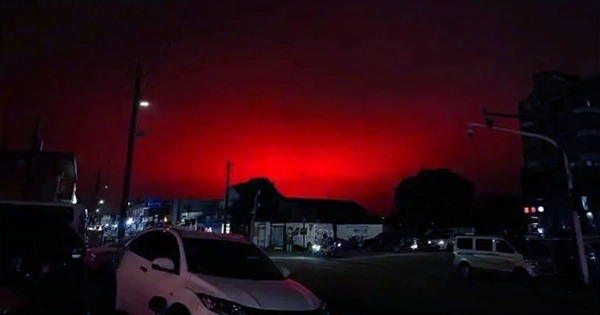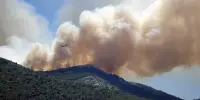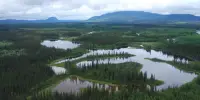Over the weekend, the sky in Zhoushan, China, turned blood red, confounding locals and prompting apocalyptic predictions on social media. The films, which shot on May 7 and circulated on Chinese social media sites Weibo and Sina, show bemused passersby staring at the strange sky. As ominous as it may appear, the explanation has more to do with wavelengths than the end of the world. The glow was created by lights from fishing boats in the local port, according to the Zhoushan Meteorological Bureau.
“When the weather is favorable, more water in the atmosphere generates aerosols, which refract and scatter the light of fishing boats, resulting in the crimson sky seen by the public,” the bureau said to Global Times. When it’s foggy, when high pressure traps dust and microscopic particles in the atmosphere, and when it’s overcast, red wavelengths move through the air more easily than blue ones.
The Met Office of the United Kingdom notes, “A crimson sky develops when dust and tiny particles are confined in the atmosphere by high pressure.” “By scattering blue light, only red light remains to give the sky its distinctive aspect.” Interestingly, this may occasionally be used to anticipate the weather, as memorialized in the expression “red sky at night, shepherd’s pleasure, red sky in the morning, shepherd’s caution.”
A red sky in the morning in regions of the world where weather systems travel west to east signifies that the area to the east is under high pressure, trapping microscopic particles that colour the sky red. This signifies that the region of high pressure has shifted east, signaling that a low-pressure system – maybe a cold front or rain – is approaching. Meanwhile, if the sky becomes red at sunset, it indicates that a high-pressure system is approaching, and you should expect “shepherd’s pleasure,” or pleasant weather.
In this post, we examine several of these proverbs to see if there is any scientific evidence to support them up. Weather forecasting has relied on human experience rather than scientific data for thousands of years. As sailors and farmers sought solid forecasts ahead of time, the sayings were increasingly essential. The traditional weather sayings and expressions that we see and hear today evolved from this.
















